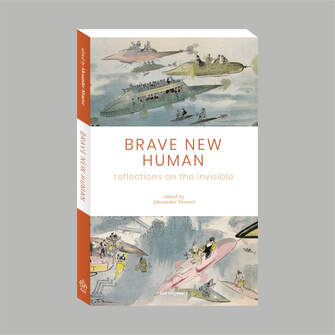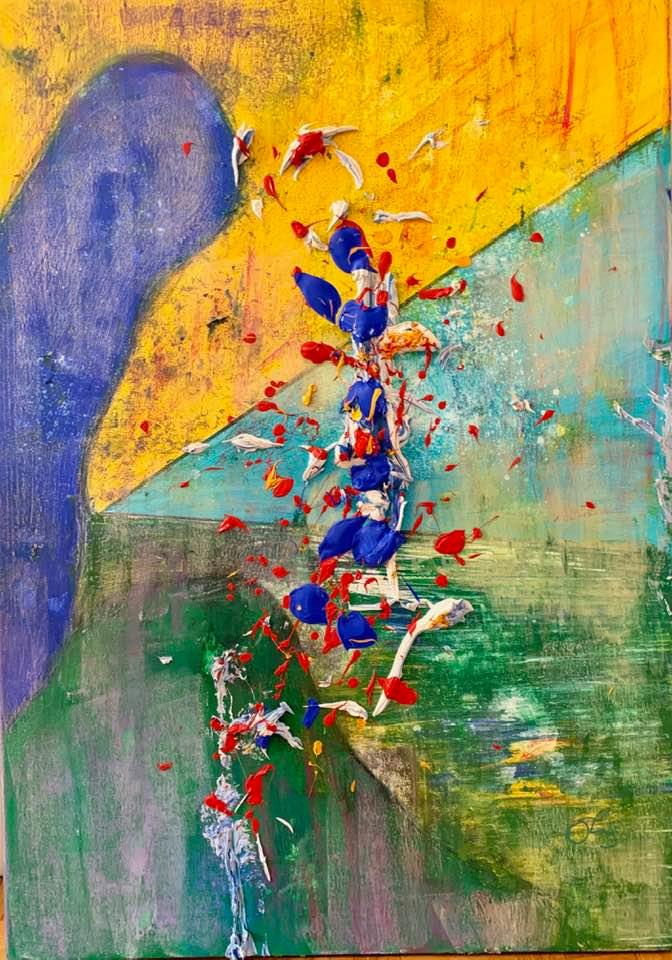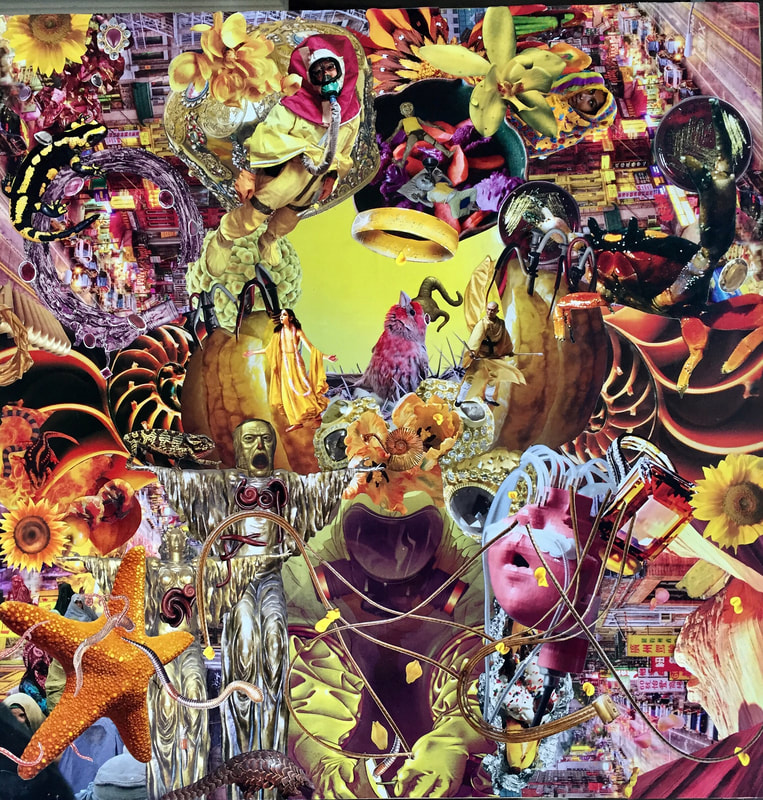Style: Essayistic - Excerpt from the book, Brave New Human: Reflections on the Invisible, edited by Alexander Mouret
Author: Mashya Boon
Bio: Mashya Boon is a Dutch international Ph.D. student in the department of English at Michigan State University, specializing in Film Studies. Her research interests lie at the intersection of film-philosophy, posthumanism, and the genres of SF and horror.
The fashion in which Annihilation figures a novel kind of being human opens up avenues for exploring how ‘the posthuman’ is imagined within contemporary cinema while forwarding a salient stance about mutation and life. Posthuman literally means: an entity which is beyond the human as we know it. Posthuman theory in accordance generally questions the perception of human nature as universal and hegemonic, while overthrowing Enlightenment-legacies which ingrained a discourse of exceptionalism of the rational human subject into our society’s fabric of thought. This paper analyzes the ways in which Annihilation’s iridescent ‘Shimmer’ with its viral-like growths produces evocative instances of terrifying transformation, which seem painfully poignant in times of our current COVID-19 crisis. This film poses a philosophical thought-experiment by questioning “what counts as life?” By scrutinizing Annihilation’s viral tendrils in light of Karen Barad’s and Donna Haraway’s theories, this paper highlights how we might benefit from a transformation in anthropocentric thought. The film’s stance can be aligned with a new-materialist view of nature: a strange (re)turn to an otherworldly nature where the boundaries between technology and the organic are mixed on a cellular level, where hybridity and impurity prevail as the formerly discrete units of human life are scattered across a novel posthuman mosaic of convalescing mutation.
“It wasn't destroying. It was changing everything. It was making something new.”
This line, uttered by protagonist Lena (Natalie Portman) in a final scene, explicitly verbalizes that Annihilation is not about absolute destruction. In this scene, a military official interrogates Lena, after returning from the Shimmer. This alien environment came into existence after a meteor crashed onto a lighthouse at the southern coastline of Florida. The Shimmer expanded exponentially, threatening to take over the entire globe. The ‘infected’ area which it spread to, is designated as ‘Area X’. The military took great precaution to prevent the general public from knowing about it. Still, the military can only guess as to what the Shimmer’s nature entails: a religious event, an extraterrestrial event, a higher dimension? They have many theories, but few facts.
The entire environment within the Shimmer has gone berserk: different species of plants intermix their usually distinctive structures into one new conglomerate whole. Not only plant life took on this hybridizing quality; also fungal, animal and even human lifeforms are affected by the Shimmer’s transmutations which produce stunning new composites of life. Faun-like deer with bark-like antlers endowed with fluorescent flowers and prehistoric bear-like monsters with exposed craniums who adopt their victim’s last cry populate Area X. The way the Shimmer operates is explained halfway by expounding that magnetic forces within this zone literally refract all particles present in the environment. Not only light gets deformed into fantastical rainbow hues that seep into mother nature, but also all previously discrete units of DNA of various species are scattered and remixed into new syntheses by the Shimmer’s prism. All matter becomes susceptible to radical change within its ontological core. Humanoid shaped ‘plants’ and crystalline ‘trees’ only seem to be the beginning of this planetary metamorphosis. All living species are refashioned, immanently altering the traditional categories of what life on earth entails.
Tracing the etymology of the word ‘annihilation’, it is composed of two parts which in a contradictory sense annul each other while fortifying the word's meaning too. Annihilation in its primary definition indeed means “to reduce to utter ruin or nonexistence”: to annihilate is to reduce something into nothing. However, although the main component of the word consists of the Latin word ‘nihil’, which denotes ‘nothing’, the prefix ‘an-’ designates that the word behind it is not (or is without) the thing that is stated behind it. So in fact, ‘an-nihil-ation’, literally means ‘not nothing’. The word seen in this way rather encompasses a lacking of nonexistence. It connotes something that is without emptiness. Therefore, in its origins, the process of annihilation entails more ‘a becoming of something’ than ‘a reduction to nothing’. Aphoristically speaking, within the mechanisms of destruction resides the potential for unbridled creation itself; the making of something radically new.
Yet the common connotation of ‘annihilation’ does signify the state of being annihilated, the utter extinction of absolutely everything. This linguistic and philosophical paradox that underpins the word ‘annihilation’, also lies at the heart of the film’s core concept. Annihilation intricately conceptualizes a more-than-human, other-than-human, inhuman, posthuman state of existence which relentlessly refracts each and every aspect of life and calls into question what it means to be human or nonhuman, animate or inanimate, dead or alive. The film savagely systematizes an almost cancerous and even viral structure of being which exudes a towering form of growth and mutation of everything that is present or that has a presence in our earthly existence. Within the Shimmer, the undiscriminating force projecting out of the lighthouse encapsulates all life with its megalomanic metamorphosis. It is this kind of extreme presence of a lacking of nonexistence which annihilates the rational world and our human selves. Yet this an–nihil–ating force does not reduce reality to sheer nothingness, it in reality entails a radical state of being immanently without emptiness.
Mashya Boon
Marietje Schaake, Roanne van Voorst, Nolen Gertz, João Pedro de Magalhães, Malka Older, Gideon Shimshon, David Dye, Elsa Sotiriadis, Ivo de Nooijer, Femke Nijboer, Kristian Esser, Etienne Augé, Vera Vrijmoeth, Falko Lavitt, Wouter de Waart, Tim Reutemann, Jorrit Kelder, Robert Overweg, Jeroen van Loon, Robert Zwijnenberg, Rudy van Belkom, Frank-Jan van Lunteren, Jelle van der Ster, Yossi Mekelberg, Mashya Boon, Sander Pleij, Frederik de Wilde and Rachel Armstrong.
Please feel free to explore the free e-book online!
Alexander Mouret
Director Brave New World



 RSS Feed
RSS Feed
